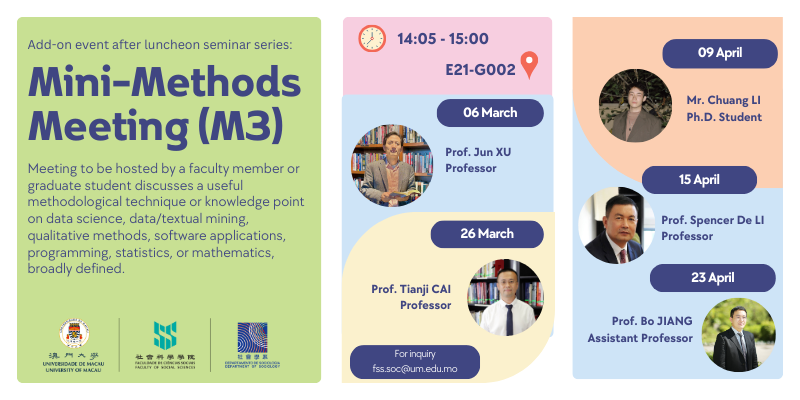

Date: April 23
Time: 1:00 pm – 2:00 pm
Speaker: Prof. Bo JIANG
Venue: E21B-G002
Organizer: Department of Sociology
Phone: 8822 4595
Social Network Analysis Using Gephi
In this talk, I demonstrate the use of Social Network Analysis to investigate extremist propaganda propagation through Telegram channels. The research quantifies the threat posed by @hkwarofindependence and its associated network by measuring the influence and harm of other channels promoting or mentioning its content. Using centrality measures such as Degree, Betweenness, Closeness, and Eigenvector centrality, the study identifies key channels within the network that play critical roles in the dissemination of violent content. By analyzing the exposure and harm scores, the research reveals which channels are most influential in propagating extremist messages and the potential risks they pose to law enforcement and the general public. Policy implications are discussed.
Dr. Bo Jiang is an Assistant Professor in the Department of Sociology at the University of Macau. He specializes in Computational Social Science (CSS) with a research focus on the intersection of artificial intelligence, global security, and climate change. His interdisciplinary work leverages cutting-edge AI methodologies to address global challenges such as climate-induced conflicts, terrorism, and extremism, through a lens of responsible AI development.
Dr. Jiang’s research is funded by prestigious grants, including the University of Maryland’s Grand Challenges Grant, where his ongoing project examines the geopolitical impacts of rising sea temperatures on the security of 109 coastal nations. This work integrates satellite imagery with causal inference methods to assess the relationship between climate change and political instability, contributing to the UN’s Sustainable Development Goals (SDGs), particularly in the areas of climate action (SDG 13) and peace and justice (SDG 16).
Additionally, Dr. Jiang’s work on extremism utilizes “found data” from social media platforms to develop predictive models that identify and counter online radicalization. His recent projects, such as the analysis of Telegram channels during the Hong Kong protests, employ advanced machine learning techniques to forecast real-world consequences of online harm. These projects aim to build an ethical framework for AI tools used in countering extremism and are pivotal to ensuring AI technologies uphold human rights and societal equity.
Beyond his research, Dr. Jiang is an innovative educator, integrating his research insights into his teaching. He has developed and taught courses on “Big Data Analytics in Social Science,” equipping students with technical and ethical competencies to navigate the complexities of AI applications. His efforts in knowledge transfer extend to law enforcement, where he regularly trains professionals from Macau’s public security agencies on using AI tools ethically in policing and decision-making.
Committed to mentorship, Dr. Jiang supervises doctoral students working on interdisciplinary research projects that explore the application of AI in criminology and legal studies. His guidance has led students to develop data-driven solutions that promote fairness and transparency in AI-driven decision-making systems.
Dr. Jiang has received several accolades for his work, including the Outstanding Academic Staff Award from the University of Macau and the Student Paper Competition First Place Award from the American Society of Criminology’s Division of International Criminology. His research has been featured in prominent media outlets such as The Guardian, Business Insider, and The American Geophysical Union, bringing public attention to the ethical implications of AI in solving global crises.
The Mini-Methods Meeting (M3), held right after the luncheon seminar. Hosted by faculty or graduate students, M3 will feature a 20-30 minute focused discussion on methodological techniques or topics in data science, programming, statistics, and more. The milieu of this series is informal and offers hands-on instruction.
- Date: 23 April 2025 (WED)
- Time: 14:05 – 15:00
- Topic: Social Network Analysis Using Gephi
- Host: Prof. Bo JIANG
*This event is open only to Sociology department members and students.

